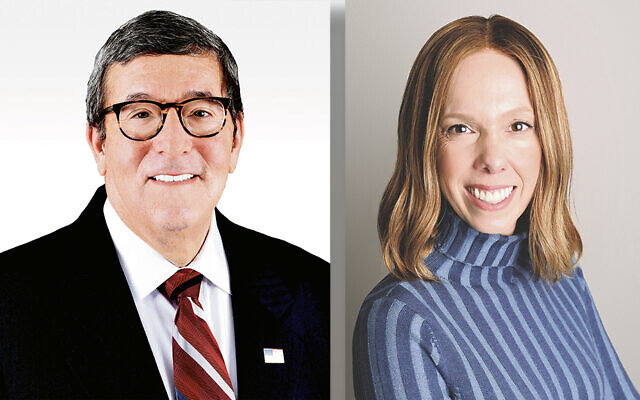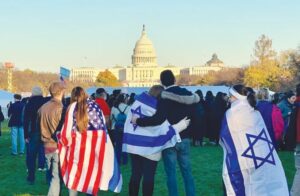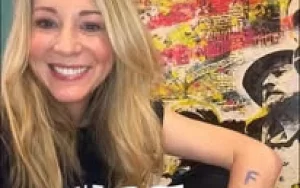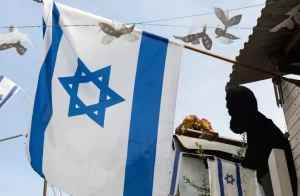Here’s some insight from local candidates on three of the 21 slates.
The election for delegates to the 39th World Zionist Congress is open.
The body, which was founded by Theodor Herzl 128 years ago, will seat 200 representatives from Israel, 173 representatives from the Diaspora excluding the United States, and 152 American Jews.
Twenty-one organizations are fielding slates.
The WZC gets to have a voice in allocating more than $5 billion over five years.
Any Jew who lives in the United States, is at least 18 years old, pays the $5 fee, and accepts the self-definition of Zionist can vote between now and May 4. Voting is online, at azm.org/elections.
Because the WZC (which is just about as hard to say as it is to type — very hard) is run according to the parliamentary system, that means that votes are cast for a party, not an individual candidate. The parties are allocated seats according to the number of votes they win; the seats are distributed according to each candidate’s position on the list. Because parties are allowed to list alternates as well as candidates, there is no way that everyone on even the most disproportionately victorious list will get a seat.
According to the Jewish Telegraphic Agency, “At the heart of this year’s election is a fierce ideological battle between liberal and right-wing Orthodox factions, each seeking to shape the future of Zionist institutions and their financial priorities at a pivotal time in Israel’s history. The results will impact key issues such as religious pluralism, funding for Jewish education, settlement expansion and Israel-Diaspora relations.”
In other words, the stakes are high.
Because northern New Jersey is one of the most Jewish parts of the country, it is unsurprising that many would-be delegates on many of the 21 slates vying for votes live here, in the catchment areas covered by the Jewish Federation of Northern New Jersey and the Jewish Federation of Greater MetroWest. We plan on interviewing one or, even better, two local delegates from many of the slates. We know that we can’t possibly talk to representatives of all 21, but we would like to talk to as many as we can.
So we will start here with interviews with advocates for three of the slates — Orthodox Israel Coalition-Mizrachi, Mercaz, and Kol Israel. We hope to have more next week. And readers, if you represent or know a local representative from another slate, please let us know; email editor@jewishmediagroup.com.
Now let’s get started.
Orthodox Israel Coalition — Mizrachi
The Orthodox Israel Coalition — Mizrachi is, according to the pamphlet the World Jewish Congress puts out, “a broad-based coalition led by slate sponsors Religious Zionists of America and Amit”; other members include the Orthodox Union, Yeshiva University, the Rabbinical Council of America, the National Council of Young Israel, and Touro College among other, similarly Orthodox institutions. Its slate is headed by Yeshiva University’s president, Rabbi Dr. Ari Berman of Teaneck, and the Orthodox luminary and YU rosh yeshiva Rabbi Hershel Schachter.
Mark Levenson of West Orange is a lawyer and Jewish communal leader who is high on the OIC’s list; he is on the RZA’s executive committee and is cochair of the campaign.
He remembers the WZC elections from his Boston childhood. “I remember that every five years, the rabbi or the president would give a very dry, boring 10- to 15-minute talk to explain why we should vote, and at the end of the day, the number of people who would vote was minuscule,” he said. (But he loved his rabbi, he added.) “Fast forward to the last election — it was probably the biggest jump in voters. Approximately 125,000 people voted. This time, I’ll be shocked if we don’t go to 200,000, or even 250,000 votes.”
Why did the numbers increase as they did the last time, and why does he think that trend will increase? “First, because of the growth in the number of slates,” he said; the last time, there were 15, and that was more than the election before. More slates mean more people, and more interest. “Second, we cannot dismiss or ignore the explosion of social media. And third, October 7, which really has been a shift changer.”
“We have all been so depressed, so despondent, and Israel has been pilloried beyond belief.” The election is a way to do something, Mr. Levenson said, “and I do believe that because of these factors, we will see a significant increase in the number of voters.”
His slate represents “a wide umbrella,” he said. “It is a modern wide tent,” ranging from centrist Orthodoxy, to the right — “we have some Charedim and pure yeshivish, some black hats, but other slates represent them more” — and also leftward, toward modern Orthodoxy.
“The face of our campaign is Rav Doron Perez, the chair of the Mizrachi World Movement,” Mr. Levenson said. The Perez family’s story is nearly unbearably tragic. Rav Doron and Shelley Perez had two sons and two daughters. Both of their sons were in the IDF. The older one, Yonatan, was severely injured in Gaza; the younger one, Daniel, vanished from his base on October 7. The family eventually learned that he was dead. His body still is being held in Gaza.
“Yonatan was engaged to be married,” Mr. Levenson said. “When he got out of the hospital, there was a discussion about whether they should proceed with the wedding. They did. And this week they gave birth to a son. That is amazing and wonderful.”
Why vote for OIC-Mizrachi?
Because the Israelis the party represents — religious Zionists — “are a significant and growing part of the population. It’s maybe 10 to15 percent, yet because of the love of Zionism, an overwhelmingly disproportionate amount of Mizrachi Zionists serve in the IDF,” Mr. Levenson said. “I hesitate to give percentages — some people say 50 percent, but I don’t know. But I do know that it’s a dramatically disproportionate overrepresentation relative to the population. And logically, an overwhelming percentage of those have been killed or wounded are from the Zionist Orthodox world.
“We focus on people who share our values. We support our chayalim” — the soldiers — “and that’s not just with emotional and structural support but also with financial support.”
Because the WZC can be so influential in distributing funding that comes from around the world, “our goal is to win votes, because the more votes we have, the more delegates we have, the more positions of influence they have, and the greater the chance we have to pass on more of our values.”
Those values, he continued, include the new B’nai Akiva complex, “which has 145 beds for lone soldiers, who can stay there every Shabbat. They don’t have to go back to some lonely apartment. And a lot of money goes to rebuilding devastated Israeli communities. Educationally, we send thousands of shlichim” — emissaries, or more understandably counselors — “to day schools in America. And to colleges. YU and Touro are fantastic, but they don’t educate the majority of Orthodox students in America. There are a lot of fine and not-so-fine universities and colleges with tens of thousands of Orthodox Jews, so we support JLC,” an outreach program.
“Probably a majority of Jewish day school graduates go to yeshivas and seminaries in Israel for their gap year, and if Mizrachi didn’t support them, the tuition bill would be even higher,” he continued. “We help provide Torah-based curriculum in Israel and abroad. We fight antisemitism on campuses worldwide.
So, Mr. Levenson concluded, people should vote for OIC-Mizrachi. “Spend $5, take five minutes, and just do it,” he said.
Chana Holzer Shields of Teaneck is the other OIC-Mizrachi cochair, and she, like Mr. Levenson, is high up on its list.
“The basic fundamental belief of the Mizrachi movement is to build Israel,” Ms. Shields said. “Everything that we do is to contribute to Israel’s future, and everything that we have done over the past 120 years is to advocate for strong Jewish values and strong national values to serve and build the state of Israel.”
Like Mr. Levenson, she pointed to the high number of movement members who join the IDF. “We are the first to volunteer to rebuild in both the north and the south. We have built a strong school system, programs for lone soldiers, for milluim wives” — that is, for the wives of reservists who are called up to the IDF.
“We have always been centrists and unifiers. We have brought both sides of the aisle to the table, to the middle. We truly believe in respect for all, and working in unity, and we’ve shown that over the past 120 years by our actions.
“We feel that we are the only party that can bring the extremes together to a consensus, and that is vital for the Jewish people and the state of Israel.”
Ms. Shields first was elected to the WZC in 2015; she won a seat again in 2020, but then the pandemic intervened, and the congress was held online. There was a special meeting of the WZC in 2023 — there were no elections for that one because the seats were filled by the candidates who had won them in 2020 — when the extraordinarily divisive issue of judicial reform was tearing up Israeli society. “Factions on both sides were using it for political gain,” she said. “It was being used as a divisive tool. There was such animosity within the hall that there were demonstrations, and people were screaming at each other. I actually saw people come to blows. A physical altercation. One side would bring in a speaker, and the other side would stand outside screaming. I couldn’t even get to the bathroom because people were blocking the halls.
“And that was an indication of what was going to happen.
“October 7 didn’t happen just because of Hamas. It happened because the temperature was ripe for it at the time of the attack. Because the extreme factions were so concerned with promoting their own narratives and positions that they wouldn’t sit down at the table together to talk about what is best for the future of Israel.
“Our interest is the future of the Jewish state, for all Jews. It is important to us that there are voices from different positions, and we can bring them together in a way that is productive and useful for everyone.
“Our party is specifically Orthodox. We represent a wide range of Orthodoxy, and politically we have a very centrist voice.”
Ms. Shields talked about how hard it is for people from different parts of the Jewish world to meet, but how rewarding such meetings can be. “In October 2023 I was chairing the AZM biennial, and my cochair was a very progressive Reform woman,” she said. “We worked together beautifully, and we developed a friendship, and an understanding of each other on so many levels. That is usually not afforded to us in any other venue, not because we are avoiding each other, but because we just don’t interact enough. The two of us said that this time we were going to go for unity, and everything we did over the course of that two-day event was geared toward promoting the unity of the Jewish people.
“My hope is that people who really want to build Israel will put their own interest aside and realize that it is more important for us to come together and be able to talk to each other.”
That said, “we do represent the dati leumi” — religious Zionist — “community, and we stand by the ideals that there should be a Torah influence in Israel,” Ms. Shields concluded. “And we are always dedicated to the state of Israel, with tolerance and with understanding.”
Mercaz USA
Mercaz USA is “the voice of Conservative/Masorti Judaism,” according to its statement in the WZC’s pamphlet. It sponsors the organizations that make up the Conservative movement — the Jewish Theological Seminary, the Ziegler School of Rabbinic Studies in Los Angeles, United Synagogue of Conservative Judaism, the Rabbinical Assembly, and the National Ramah Commission, among others. Its slate includes quite a few people who live locally.
Dr. David Fine is the senior rabbi of Temple Israel in Ridgewood.
He explained why he thinks the WZC matters. “The Zionist Congress is the closest thing that we have to a world parliament of the Jewish people, and we are a small people of multiple opinions,” he said. “I say the same thing about Israeli bureaucracy. It’s completely disproportionate to the size of the country.
“So we have these multiple opinions, and the WZC is an opportunity to come together as one people and find common ground. It gives us the opportunity to respectfully acknowledge the things we disagree on, and that’s particularly important now, when Israel has been facing an emergency.
“We are still responding to the trauma and tragedy of October 7, and we are trying to imagine what things will start to look like when the hostilities calm down. And they have been more quiet now, thank God.” (Readers should note that this conversation happened before bombing in Gaza resumed on Monday night.) “It’s an important opportunity to express the different visions that exist for Israel and the Jewish people.
“Israel is facing its own parliamentary election, which needs to happen within the next eight months, as the Knesset term will expire. And one of the important things about Israel is that no matter what is going on, it is committed to its democracy. There will be an election, and that’s an opportunity for the Israeli people to tone their priorities. The Zionist Congress is an opportunity for the Jewish people as a whole to do that.
“What happens in the Zionist Congress is reported in Israel. Aside from the influence that the Congress has on the allocation of funds and funding priorities, it’s an opportunity for the Jewish people as a whole to do that, to consider their priorities. And the Israeli public doesn’t ignore the sense of where the Jewish people as a whole are.”
The tension and divisions created by the judicial reform controversy haven’t gone away, Rabbi Fine continued. “No one has forgotten the questions that were raised about the structure of Israeli democracy, and that’s something that the World Zionist Congress can weigh in on.
“It was the first World Zionist Congress that established the vision of a state of Israel and was committed to it being democratic and that it follow the best traditions of Western democracy, and that’s what the World Zionist Congress continues to be committed to.
“And that’s America’s vision, and it’s the vision that the Conservative movement’s slate is committed to.”
The Conservative movement has been underrepresented in earlier WZCs, Rabbi Fine said, but its representation has increased and this year “we have worked on getting out the vote.” Part of the problem is structural, he said. “It’s the challenge that every centrist party faces in every election. It’s easier to get out the vote when you hold a position on one end or the other. It’s harder to be passionate about the center. But the center needs to hold.
“The center is essential. In the center you’re in the unique position of being able to work out common ground between those who are committed to progressive visions of Zionism on the one side, and those who value Jewish tradition and religion on the other side. If there is any hope for achievement of unity among the Jewish people, we need a strong center.
“And we need a strong Mercaz to help us reach that common ground.”
Dr. Alan Silverstein is rabbi emeritus of Congregation Agudath Israel in Caldwell. He’s now the president of Mercaz Olami, the Conservative movement’s worldwide group, and the cochair of the WZC campaign.
“I’ve written a small book about why to vote Mercaz,” he said. “I am very involved.”
He listed the reasons to vote in the WZC election in general, and for Mercaz in particular.
“With Israel at war, and being attacked ideologically on campuses, it’s important to keep as many Jews as possible identified with Israel,” he said. “After the election, the World Zionist Congress is supposed to be a wall-to-wall Zionist coalition. The left wing is there, the right wing is there, the religious parties are there, the secular parties are there. Everybody is there, because we want as many people to connect to Israel as possible.
“The people on the far right, whose parties control the Knesset today, want to have a situation in the WZC like the Knesset, where the only people in the coalition are the people who agree with them. That would severely damage the world Zionist movement, because it would push everyone who is not right wing enough in their Zionism away from the table.
“That would be a disaster.
“Mercaz is a centrist party. We want everybody at the table. We want as many people who identify with Israel as possible, even if we disagree on policies. We can debate policies. That’s okay. But everyone has to be at the table.”
“We also have to maximize the number of people who identify with Israel,” Rabbi Silverstein continued. “We want a fair, equitable allocation of a huge amount of money to the Diaspora for Israel programming — programming that connects people to the Jewish state, that gives the opportunity to engage with Israelis. The right-wing parties want to have all that funding only go to people with whom they agree. That would be a disaster.
“We need Israel programming in our movement so that the hundreds of shlichim at the Ramah camps, who are so crucial to the Ramah experience” — and who are young Israelis who spend the summer at the Conservative movement’s camps, not only telling but also showing campers what it means to be Israeli — “are paid for with money that comes about due to Mercaz’s success in the election.
“When people from our movement go to Israel, the connection intensifies. Every 10 years, the international Rabbinical Assembly is held in Israel. We just had such a convention.
“The president of the Rabbinical Assembly is from New Jersey,” he added parenthetically. “It’s Rabbi Jay Kornsgold, from Beth El Synagogue in East Windsor.
“The convention was an enormous success, with about 250 rabbis. It intensified their identification with Israel. And in this time of hugely expensive air fares and other extraordinary costs it would not have been possible without funding that came about through Mercaz’s involvement in the WZC.
“This all is made possible due to funds that should and do come our way, due to our success in the World Zionist Congress. That doesn’t mean that we don’t want money to go to other groups. We do.
“But if we’re not successful, the absence of a wall-to-wall Zionist coalition will mean that groups like ours, and the Reform movement’s group, and the others that are not part of the far right will be excluded — and these are the groups whose members need most to have their connection to Israel reinforced.
“It’s less urgent if your people all go to yeshiva. That’s great, but it’s more urgent for the average young America Jew.
“So we have to keep the Zionist movement comprehensive. We need unity without uniformity. We have to have funding for as much internal programming as is possible, particularly for the groups that need ongoing infusions of Zionism. And we have to do whatever we can to strengthen Israel/Diaspora relationships, which unfortunately, are not as strong under Netanyahu’s leadership as they should be.”
Such issues as the environment, the role of women, the fight against discrimination for the LGBT community — all of this is vitally important, Rabbi Silverstein said. And working toward peace is paramount.
“We’re a religious movement,” he concluded. “We don’t have the extremes. We don’t have the far right. We don’t have the far left. We have the center, the center left, and the center right. We have a range of positions among individual members. But the bottom line is that our goal, in the absence of a two-state solution being implemented, is to shrink the conflict. So anything that’s going to increase the conflict, that’s going to make the prospect of a two-state solution impossible, we have to try to make sure it doesn’t happen.
“We want Israel to be a democratic state and a Jewish state. We want both.
“And we want votes.”
Kol Israel
“In this time of crisis, we must put our differences aside, stand together, and empower bold new Zionist ideas!” Kol Israel tells us at the top of its page in the WZC election pamphlet.
That idea bears itself out in its list of candidates, which range across some obvious lines, most particularly of religious streams.
“This line is the opposite of a party,” Michael Schlank, the CEO of NJY Camps, said. “It’s nondenominational and apolitical. It is an educational Zionist youth movement. We serve the entire Jewish community and Zionism in the Diaspora, and a now focus on antisemitism is at the core of the work we do.” He was talking about Kol Israel — and also about the work that he and his colleagues do at the network of camps they run.
The party is supported by StandWithUs, which, according to its website, is “an international and non-partisan Israel education organization that inspires and educates people of all ages and backgrounds, challenges misinformation, and fights antisemitism.”
It’s also backed by Young Judaea, which calls itself the “oldest Zionist youth movement in North America.” Its CEO, Adina Frydman, is high on Kol Israel’s delegate list.
The party’s focus on young people is clear and seems particularly logical for someone whose job is working with and for them.
“Representing this party seems like a no-brainer,” Mr. Schlank said. “We are simpatico with StandWithUS and Young Judaea. From an organizational standpoint, this made a lot of sense. It’s a simple platform of Zionist education, mutual responsibility — our core values — and the idea of being the cutting edge of Zionist 3.0 is what we do every day.”
Isn’t it inherently contradictory to declare yourself and your party to be apolitical as you and your political party run in an election? Yes and no, Mr. Schlank said. Yes, of course there’s a political element to this part of it, the running part, “because we’re trying to promote what we believe, but it’s apolitical in the sense that we don’t think of this as a zero-sum game. The slate has people from the Reform, Orthodox, Conservative and non-affiliated worlds, and we don’t view that as necessarily political. We view it as taking our rightful place in this Jewish community.
“We have 130 people on the slate, and I believe that we have the most under 30 of any of the lists. Our entire zeitgeist is to get young people involved, to say ‘Let’s be positive about Zionism, about the Diaspora, and let’s take our place.
“Our space is natural. It is non-adversarial. It is unaffiliated, undenominational Zionism. And really interesting people from all over the country, who are really involved in the Zionist space, in a really nonconfrontational, positive way, are part of it.”
Stacie Friedman of Scotch Plains is the president of the board of the NJY Camps. She’s also on Kol Israel’s slate.
Like Mr. Schlank, Ms. Friedman talks with great excitement about the woman whose passion for Kol Israel drew her to it.
“It started when we hosted Machane B’Yachad,” a program that brings Israeli kids to camp for a two-week program. “While they were there, we visited, and Fleur Hassan-Nahoum was there too.”
Ms. Hassan-Nahoum is a British-born Israeli, a barrister, politician, and thought leader, who recently completed a stint as deputy mayor of Jerusalem and is now, among many other things, the secretary general of Kol Yisrael.
“We were together in a golf cart driving through camp, and as we sat there, riding backward, bonding, we starting talking. It was bashert. We talked and talked; we talked about the WZC, and then about Kol Yisrael.
“At first, it piqued my interest. I hadn’t known about it.”
She hadn’t known much about the WZC elections, Ms. Friedman added; she belongs to a Conservative shul, Congregation Beth Israel in Scotch Plains, and she’d heard about it there. But “Fleur was talking about the influence we can have, with $5 billion, to improve life in the Diaspora and in Israel.
“And then she started talking specifically about Kol Yisrael, about empowering youth. I have three kids — they’re 25, 22, and 16 — and as she was talking, I was thinking about how I always want to empower them, to give them ways to be involved in the community. And I hear that about 40 percent of the list are under 35 or 40 — that was incredible. I really want to hear young voices. I really want to bring Zionism into this time. Into this season.
“My two older kids are both in grad school. One goes to Seton Hall, so she really doesn’t have to deal with antisemitism, but the other one is at the University of Pennsylvania, which is not great. So to know that there is a party that supports education, that teaches people, that leads with real learning — which the other side does not — I really was attracted to that.
“And Kol Israel is nondenominational. It really wants to engage learners, to bring forth Zionism, to combat antisemitism. Those all are things that are important to me.
“That’s when the light went on for me. We can all bond together and fight for something that matters. We are proud Zionists. We are proud to have a state. This is the place where I can make the most impact and educate those who don’t know much about Zionism.”
Ms. Friedman knows that her position on the list makes it unlikely that she will get a seat in this congress, no matter how well the party does, and she’s fine with that. It’s fair, she thinks, and she’s new to this. But her standing as a candidate, no matter how unlikely, gives her the fuel she needs to talk about the party, the election, and Zionism and Israel with her friends.
“I’ve been talking to my friends, to people I serve with on other boards. I’ve been doing lots of outreach, using my social media. I’ve been trying hard to be the best ambassador that I can be, to be available. To make it not too hard to have difficult conversations.”
As a former teacher, Ms. Friedman added, “I am able to educate. It has become another part of my skill set, and I get to use it.”
“And I love the fact that once the election is over, all of us on the list will sit down and craft the platform together,” she concluded. “We will talk about the things that matter. It would be wonderful to be higher on the list in future years, and then maybe take a seat. That is a wonderful dream and a chance to grow.”




